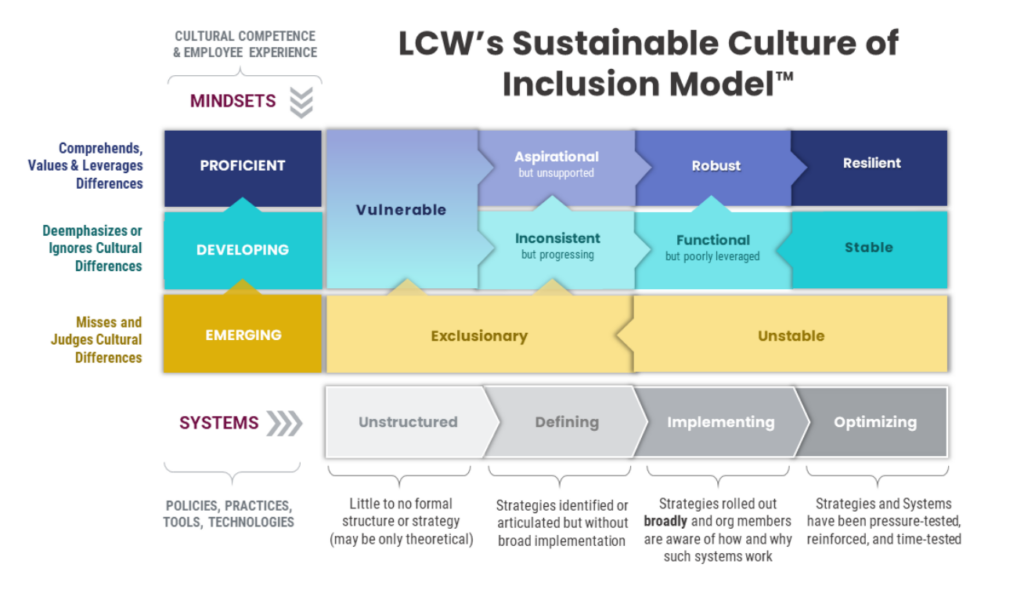The LCW Approach
Applying an evidence-based strategy for success

who we are
Your partner in cultural competence and collaboration
Our Mission
To inspire kindness, deepen understanding, and spark positive change in the communities where people live and at the organizations where they work.

Why we take a culture-first approach
Using culture as our foundation, our work stays relevant and authentic as we seek to better understand ourselves, our colleagues, and our clients through individual and collective values and behaviors. Culture affects all facets of our personal and professional life, and our approach helps us help every team member thrive and drive performance – whoever and wherever they are.
Our vision
We are a team of innovative, caring agents of change who apply our cultural competence, know-how, and real-world expertise to shape the future of global work.
LCW values
- Championing cultural competence
- Innovating transformative solutions
- Wowing our clients, our colleagues, and ourselves
- Listening for discovery and understanding
- Sustaining ourselves with wellness, connection, and fun
our approach
LCW’s Sustainable Culture of Inclusion Model™
Move your organization toward a more inclusive culture with a customized learning journey.
LCW’s Sustainable Culture of Inclusion Model™ is a framework for understanding what “success across cultures” looks like as well as a roadmap for creating it. Based on 20+ years of global experience, this framework analyzes organizations’ mindsets and systems to help move away from exclusive behaviors and instead leverage the benefits of cultural difference.
At LCW, we believe an exclusionary culture is a liability that creates unwanted turnover, missed targets, and poor performance. Research shows that building and maintaining a culture of inclusion positively influences employee engagement, increases job satisfaction, and decreases attrition.
Mindsets
Cultural competence and how employees adapt to difference in the workplace
Mindset
Emerging
Cultural diversity is not seen as a strategic asset, and most leaders and individuals think that recognizing differences and adapting to them is unnecessary, irrelevant, and/or problematic.
Mindset
Developing
Most people in the organization tend towards assimilation to a dominant norm or type; people may appreciate cultural differences but are not yet able to leverage them for mutual gain.
Mindset
Proficient
Cultural diversity is seen as a strategic asset, and people are skilled at leveraging cultural difference for mutual gain throughout the organization.
Systems
Policies, practices, tools, and technologies for managing people and culture inclusively, with clear outcomes.
Systems
Unstructured
Little to no formal structure or strategy (may be only theoretical).
Systems
Defining
Strategies identified or articulated but without broad implementation.
Systems
Implementing
Strategies are rolled out broadly; organization members are aware of how and why systems work and willingly deploy them.
Systems
Optimizing
Strategies and Systems have been pressure-tested, reinforced, and time-tested.
LCW Sustainable Culture of Inclusion Model™ FAQ
Mindsets are individual employee’s skillsets related to cultural competence. When we assess mindsets, we seek to understand how the organization as a whole approaches cultural difference and what the impact of that approach is on the employee experience at an individual level.
Systems are an organization’s talent policies, practices, tools, and technologies for managing people and culture. They may affect the organization’s hiring process, promotion process, and how the organization retains top talent.
At LCW, we believe an inclusive culture is—overall—a culture in which diversity is highly valued and where deep trust and successful collaboration lead to innovation and exceptional performance. In such a culture, leaders can clearly articulate, communicate, and demonstrate the value placed on cultural differences not only for maximum team effectiveness and belonging, but also for creating new products, services, and revenue streams.
To understand the organizational mindset, LCW looks at both the mindsets of individual leaders and the employee experience. Intercultural Development Inventory® assessments are used to help understand the individual level of cultural competence for key leaders in the organization. The Inclusive Collaboration Assessment (powered by RallyBright) is offered to assess the collective level of engagement for the workforce as a whole. Existing employee opinion data can also be used to evaluate overall inclusion and collaboration.
In order to understand what inclusive policies, processes, tools, and technologies are in place for managing people and culture, LCW looks at 20 fundamental components of people systems. We seek to understand if these components currently exist, and—if so—whether they are designed to leverage cultural difference as an asset and produce equitable outcomes.
If you want to learn more about how we can use this model to assess your organizations mindsets and systems, contact us to set up a preliminary consultative diagnosis.






